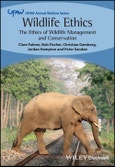A systematic account of the ethical issues related to wildlife management and conservation
Wildlife Ethics is the first systematic, book-length discussion of the ethics of wildlife conservation and management, and examines the key ethical questions and controversies. Tackling both theory and practice, the text is divided into two parts. The first describes key concepts, ethical theories, and management models relating to wildlife; the second puts these concepts, theories, and models to work, illustrating their significance through detailed case studies on controversies in wildlife management and conservation.
The book explores pressing topics including human responsibilities due to climate change, tradeoffs when managing zoonotic disease risks, the ethics of the wildlife trade, culling non-native species, indigenous wildlife use, and zoo-based conservation programs. Readers are encouraged to explore different ways of valuing wild animals and their practical implications.
This essential text: - Explains and explores relationships between valuing biodiversity, human utility, ecosystems, species, and animal welfare - Describes established approaches to wildlife management, such as sustainable use, and emerging concepts, such as compassionate conservation - Discusses key ethical theories, including utilitarianism, ecocentrism, and animal rights - Offers a practical model of how to analyze ethical issues in wildlife management and conservation
Wildlife Ethics: The Ethics of Wildlife Management and Conservation is an accessible introduction to complex ethical issues, making the book an important resource for students in fields such as conservation biology, ecology, environmental science and policy, game management, public health and veterinary medicine. It will also be an invaluable tool for wildlife managers, conservationists, One Health practitioners, practicing veterinarians and animal rehabilitation staff, contemporary wildlife professionals and other stakeholders.
Table of Contents
Foreword vii
Acknowledgments ix
Part 1 the Theory of Wildlife Ethics 1
1 Introduction 3
2 Valuing Wildlife 16
3 The Value of Wildness and Ecosystems 33
4 The Value of Species and Biodiversity 49
5 Valuing Wild Animals as Individuals 63
6 The Role of Ethical Theories 77
7 Wildlife Management and Conservation Models 94
8 Recent Movements in Wildlife Management 112
9 Moral Disagreement about Wildlife 129
Part 2 the Practice of Wildlife Ethics - Case Studies 145
10 Conservation via Commodification: A Legal Trade in Rhino Horn? 147
11 Hyperabundant Native Species: Deer in the Suburbs 160
12 “Invasive” Animals: Predator Free New Zealand 173
13 Indigenous Wildlife Use: Whaling and the Makah People 190
14 Ex situ Conservation: The Giant Panda 203
15 Wildlife Research: Toe- Clipping 216
16 Zoonotic Disease: Bad Bats? 230
17 The Cost of Green Energy: Wildlife and Wind Power 245
18 Climate Change Interventions: Feeding Polar Bears? 258
19 Conclusion: Wildlife Ethics - The Future 270
Index 279








